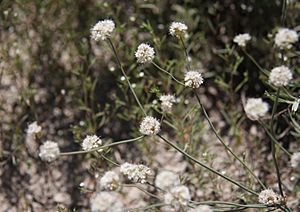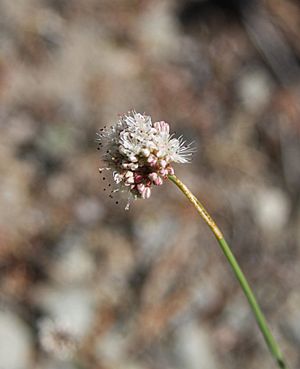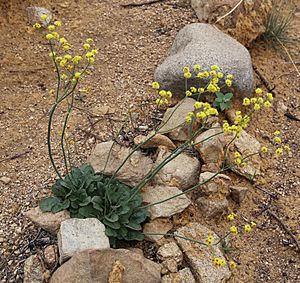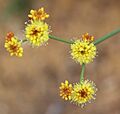Naked buckwheat facts for kids
Quick facts for kids Naked buckwheat |
|
|---|---|
 |
|
| Scientific classification |
|
| Kingdom: | Plantae |
| Clade: | Tracheophytes |
| Clade: | Angiosperms |
| Clade: | Eudicots |
| Order: | Caryophyllales |
| Family: | Polygonaceae |
| Genus: | Eriogonum |
| Species: |
E. nudum
|
| Binomial name | |
| Eriogonum nudum |
|
| Script error: The function "autoWithCaption" does not exist. | |
Script error: No such module "Check for conflicting parameters".
Eriogonum nudum is a type of plant often called naked buckwheat or nude buckwheat. It's a perennial shrub, which means it lives for more than two years. This plant belongs to the wild buckwheat family. It gets its name because its stems often look bare, without many leaves.
Contents
What Does Naked Buckwheat Look Like?
The naked buckwheat plant has tall, bare stems that can grow up to six feet (about 1.8 meters) high. These stems often split into more branches. At the very bottom of the plant, close to the ground, you'll find a group of flat, green leaves. This is called a basal rosette.
At the top of each stem and where the branches split, you'll see round clusters of flowers. These flowers can be white, light pink, or yellow. A cool thing about this plant is that its flower clusters grow not just at the very tips of the branches, but also where the branches divide. The plant's common name, "naked buckwheat," comes from its mostly bare stems.
Where Does Naked Buckwheat Grow?
You can find naked buckwheat growing in many places along the west coast of the United States. This plant is special because it can live in so many different environments. It grows in wet areas near the ocean, and also in very cold, dry places high up in the Sierra Nevada mountains. It can also be found in many areas in between these two extremes.
While the naked buckwheat plant itself is not rare, some specific types or "varieties" of it are quite uncommon.
Butterflies and Naked Buckwheat
Many insects that feed on nectar, like butterflies, love to visit buckwheat flowers. The flowers provide them with a sweet drink! One special type of butterfly, called Apodemia mormo langei, relies on naked buckwheat as its main food source. This means the plant is super important for these butterflies to survive.
Different Types of Naked Buckwheat
There are many different kinds of naked buckwheat. Scientists group them into varieties and subspecies. Each one might have slightly different features, like the shape of its leaves or the color of its flowers. Some of these varieties are named after the places they grow or special features they have.
Images for kids
 | Ernest Everett Just |
 | Mary Jackson |
 | Emmett Chappelle |
 | Marie Maynard Daly |




